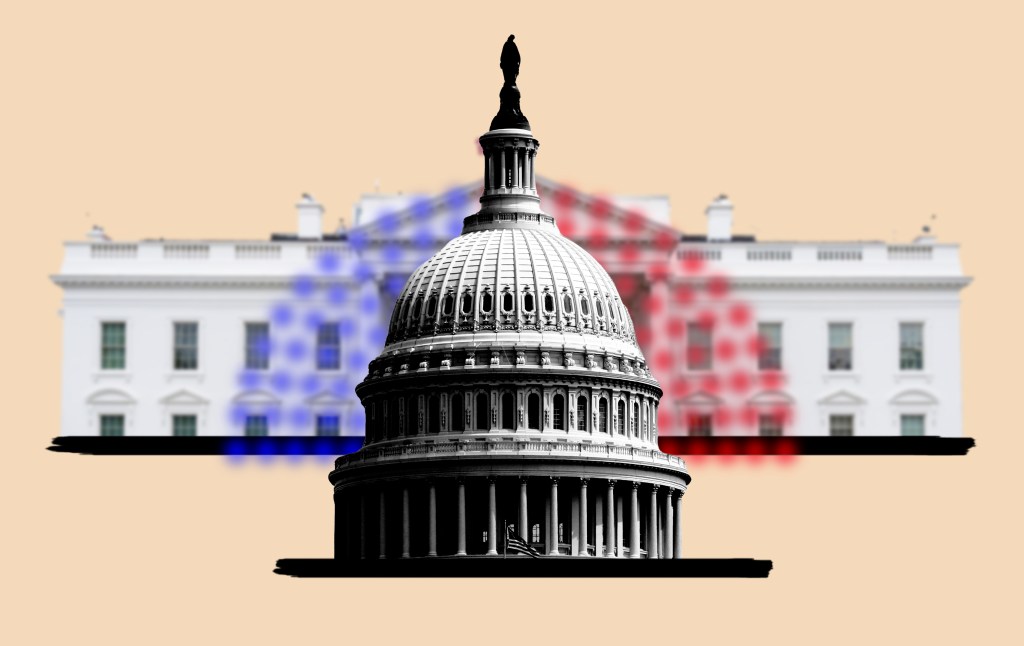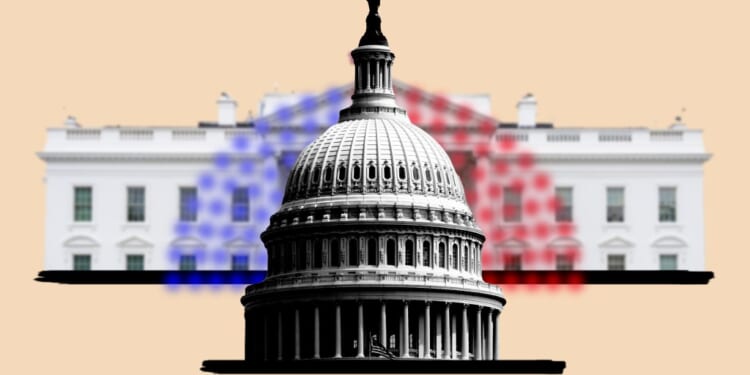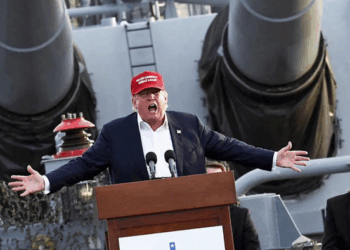
There I was, minding my own business last week, when—ding—I received an alert in The Dispatch’s company Slack channel from a young colleague bearing bad news: Andrew Egger, our former Dispatch colleague—and my friend and almost-next-door neighbor—was wrong on the Internet.
“Trump Is Right: The Filibuster Should Die,” read the headline of Egger’s very wrong column arguing in favor of scrapping the 60-vote hurdle for most legislation in the U.S. Senate. (In order to end the government shutdown with a GOP-only funding bill, Trump had been reiterating his long-held desire to kill the filibuster.)
To make matters worse, the young Dispatch colleague who alerted me to the fact that Egger was wrong on the Internet did not even realize that Egger was wrong. In fact, my young colleague thought Egger was actually right and requested a debate on the subject, which is how two almost-next-door neighbors went from drinking martinis at my place last weekend to sparring in the online pages of The Dispatch today.
Before I get to just how wrong Donald Trump and Andrew Egger are about killing the filibuster, let me start with a word about what Egger gets right. He correctly diagnoses the illness of congressional subservience, but his prescription of ending the filibuster would not help heal the body politic. In his debate for The Dispatch, he writes:
The problem of Congress gradually ceding its authorities to the executive is a longstanding and bipartisan one. But Donald Trump seems determined to rewrite the record books in this department. The lawmaking powers he has bestowed on himself are vast. He has proclaimed himself the final authority on government spending levels through DOGE and rescissions. Ditto with tariffs, where he has abused emergency authorities to utterly reshape the face of global trade. He is waging an increasingly open war on suspicious-looking boats off the coast of Venezuela. And he has simply ignored laws he does not wish to enforce, from the Hatch Act to the TikTok ban.
Underlying all these actions is a particular populist political argument: If Congress won’t act, I will.
Congress has indeed ceded far too much power to the president. But what reason is there to believe that Congress would have asserted its authority—and that we would have seen any better outcome—in any of the specific examples cited above if we were living in a world in which the filibuster did not exist? None, I believe.
“Whether it’s Trump’s tariffs or Biden’s student-loan cancellation, the thing keeping two-thirds of Congress from getting its act together is not the filibuster. It’s partisanship that keeps members of Team Red and Team Blue from defying the president of their own party even when they know he is wrong.”
John McCormack
“My point isn’t that the filibuster is directly to blame for any of these overreaches, of course. (I blame Trump!) My point is that decades of filibuster-induced gridlock have, far from encouraging comity and bipartisanship, helped sap the strength of Congress, leaving an enervated and exhausted body that Trump now walks all over with contemptible ease.”
Andrew Egger
Consider the TikTok divestment law that President Trump refused to enforce. It passed both houses of Congress with bipartisan veto-proof majorities—352-65 in the House and 79-18 in the Senate—and the Supreme Court unanimously ruled the law did not violate the First Amendment. The existence of the 60-vote rule had nothing to do with Congress’ failure to compel Trump to enforce the law.
Consider Congress’ acquiescence to Trump’s decision to unilaterally declare an “armed conflict” against suspected drug traffickers and summarily execute them via military strikes in contravention of U.S. law and natural law. There is no plausible congressional authorization for these strikes, but a majority of the U.S. Senate voted down a war powers resolution to rein in Trump. The existence of the 60-vote rule therefore has nothing to do with Congress’ failure to stop Trump’s unjust war.
Consider tariffs and spending. We already have federal laws in place that allow the Senate to bypass the filibuster in most cases of executive overreach. The National Emergencies Act that Trump has invoked to justify his tariffs allows the Senate to pass a resolution to terminate a national emergency with a simple majority, which is why resolutions terminating many of Trump’s tariffs recently passed the Senate (House Speaker Mike Johnson has not allowed a vote on the resolutions). The Congressional Review Act similarly provides that the Senate may pass bills to repeal recent actions of executive agencies with a simple majority, and that’s exactly what happened when the House and Senate passed a bill in an attempt to repeal President Joe Biden’s illegal student-loan forgiveness program. Biden vetoed the repeal resolution and successfully put taxpayers on the hook for $189 billion in illegal transfers before leaving office.
The Constitution commands that the president “shall take Care that the Laws be faithfully executed.” The Constitution gives Congress the power of the purse and the power to declare war. When the president refuses to take care that a law is faithfully executed or illegally spends money or wages an unlawful war, Congress has every constitutional right to impeach and remove that president from office. It could rein in a lawless executive simply by credibly threatening to use its impeachment power or getting serious about its power of the purse. “If Congress can get its act together, it can roll over the president. That’s what the framers thought,” the late Supreme Court Justice Antonin Scalia said in 2013. “It can do anything—it can stop the Vietnam War, it can make its will felt, if it can ever get its act together to do anything.”
The 60-vote Senate hurdle isn’t what’s keeping Congress from rolling the president. It takes two-thirds of Congress to override a presidential veto, and two-thirds of the Senate to convict an impeached president. Whether it’s Trump’s tariffs or Biden’s student-loan cancellation, the thing keeping two-thirds of Congress from getting its act together is not the filibuster. It’s partisanship that keeps members of Team Red and Team Blue from defying the president of their own party even when they know he is wrong.
Nuking the filibuster would make partisanship worse because the filibuster is typically only relevant when one party controls the White House, the House, and a slim Senate majority. So scrapping the procedural tool would give the president more of what he wants when his party controls Congress. “The filibuster does restrain the president,” Yuval Levin of the American Enterprise Institute told me. “It forces him to negotiate and deal with representatives of the rest of the country when his own party controls Congress.”
“Fundamentally, [the filibuster] serves Congress’ core purpose, which is not to enact legislation, but to facilitate bargaining and accommodation across lines of difference in our society,” Levin added. “If you get rid of the filibuster, you make bargaining less necessary. You just let the party with a two-seat majority run everything.”
Overcoming the Senate filibuster makes enacting significant new laws difficult, but not impossible. Bipartisan Senate majorities came together during the Biden presidency to pass the infrastructure bill, the Electoral Count Reform Act, the CHIPs Act, and the TikTok ban. They did the same during Trump’s first term to pass criminal justice reform, the Right to Try Act, and sanctions on Russia, Iran, and North Korea.
Nuking the filibuster would not strengthen the power of Congress in relation to the president, but it would increase the power of the federal government at the expense of the states and further inflame our national politics.
Although making it easier for a Democratic or Republican trifecta to enact new laws also means making it easier to repeal existing laws, neither major party today appears eager to devote energy to returning power to the states. We’d end up with new federal mandates, new federal entitlements, and new federal crimes passed by one party with a narrow majority.
The ability of one party to make sweeping national change with a slim majority would raise the stakes of every federal election even more. And what would it do for confidence in and the integrity of our federal elections when one party is writing the rules and federalizing issues that ought to be left to the states?
Advocates of scrapping the filibuster often argue that ending it will actually lead to political moderation. The theory is that once partisan trifectas have the power to more easily enact laws, parties will drop their support for ideological messaging bills due to fear of voter backlash. Both parties would “have to admit to their base that some of the stuff they’ve been promising isn’t actually viable,” writes Matthew Yglesias.
I’m skeptical of this theory. The overwhelming majority of members of both parties come from safe districts or states where they are more afraid of primary challengers than the general electorate. Every must-pass bill to fund the government would become a negotiation between the president and his party’s most extreme and moderate members, and the moderates don’t have a great track record.
The parties have a decades-long history of squandering their political capital and losing their trifectas at the earliest opportunity available. Since Bill Clinton was elected in 1992, every time partisan control of the White House changes, the new president’s party also has had control of Congress but lost its trifecta during the subsequent midterm election (the lone exception to this trend was the fluky post-9/11 midterms when George W. Bush’s approval rating was nearly 70 percent, and Republicans regained control of the Senate after having lost it due to the defection of a liberal Republican). Politicians also misjudge what is and is not politically viable, so there is every reason to expect the parties to go for broke in a filibuster-free world.
“The filibuster does moderate outcomes,” Levin said. In 2013, the Senate under Majority Leader Harry Reid got rid of the filibuster for executive branch appointees, and that “has meant worse appointments,” Levin added. “We would not have RFK and Pete Hegseth if you needed 60 votes for appointees, but we still would have Marco Rubio.”
Without the legislative filibuster, the country would swing much more wildly on policy from one extreme to the other—both in ways we can and cannot foresee at the moment—each time a party gained a trifecta. Even with the best attempts at popular governance, swings in partisan control would continue due to things beyond the control of the federal government, such as the business cycle.
One might think the Supreme Court would save us from either party trampling too much on individual constitutional rights, but nuking the filibuster is the first step toward packing the Supreme Court and turning it into an appendage of the party in power. So President Alexandria Ocasio-Cortez might add four Supreme Court justices during a Democratic trifecta, followed by 14 justices appointed by President J.D. Vance with a Republican trifecta, and so on. Maybe one day, if the country survives long enough, the Supreme Court could convene in Nats Park.
Maybe you don’t buy the worst-case scenario for ending the filibuster. Maybe you still think there’s something to Andrew Egger’s theory that making partisan lawmaking easier will eventually lead to Congress standing up to a president of the same party. Even so, the plausible downside tail risk is so much greater than the plausible upside that we should hope to keep it. As political analyst Sean Trende recently put it, “The filibuster is one of the few brakes holding our Republic together and abolishing it in a polarized era would be an abject catastrophe.”
But I’m not optimistic that we will keep the filibuster for long.
There’s virtually no chance that the Senate would nuke the filibuster during the remainder of Trump’s term: About half of Republican senators have recently reaffirmed their support for the filibuster, and I’d put the chances of Mitch McConnell, Susan Collins, Lisa Murkowski, and Rand Paul flipping at 0 percent. Those four are probably not the only Republican members steadfastly committed to keeping the filibuster, but any effort to nuke the filibuster with 50 GOP votes (plus Vice President Vance) could only afford to lose three of the 53 sitting GOP senators.
I do think, however, that it’s quite likely that the next Democratic trifecta will scrap the 60-vote rule. When the 50-50 Democratic Senate had the opportunity to do away with the filibuster to pass a voting-rights package in 2022, only Democrats Joe Manchin of West Virginia and Kyrsten Sinema of Arizona opposed it. One thing that gives me some hope that the filibuster might endure the next Democratic trifecta is the current behavior of congressional Democrats and their progressive allies practically begging Republicans to do it for them. That suggests they fear that even in a Senate without Manchin and Sinema, some new maverick or two could emerge to preserve the institution.
The filibuster is “most attractive to the moderate edge of the majority coalition,” Levin told me. “In the absence of the filibuster, their life would be hell. The filibuster means that they have to say no to one thing—to getting rid of the filibuster. Without it, they would have to say no to 100 things.”
“I think the filibuster is stronger than it looks,” Levin said. “That doesn’t mean the next Democratic trifecta doesn’t get rid of it. They’ll be under a lot of pressure to get rid of it, but I think there will still be real resistance.”
















